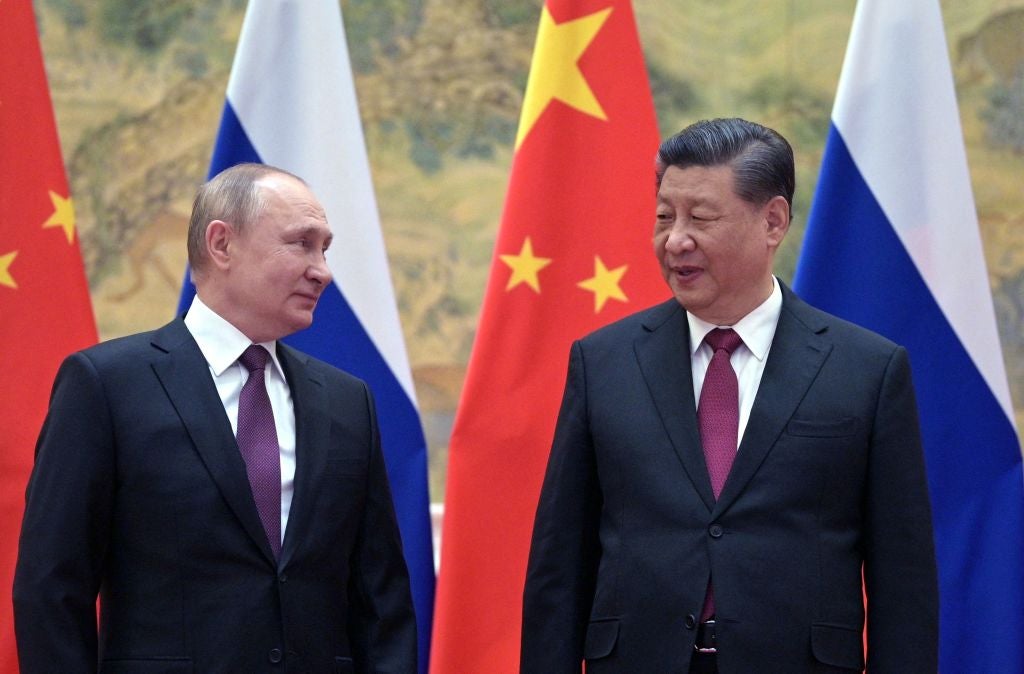
As the US was sounding the alarm over the build-up of Russian troops around Ukraine in early February, Vladimir Putin travelled to Beijing to watch the Winter Olympics.
On the sidelines of the event, he met with Chinese counterpart Xi Jinping to sign a joint statement pledging a bilateral friendship with “no limits”.
With Russia’s invasion of Ukraine facing seemingly interminable resistance, speculation has increasingly turned to the possibility of China coming to Russia’s rescue and showing just what a ‘no limits’ friendship means.
Are Russian consumers important to China?
The statement was cemented by more than kind words. The progressive tightening of Western sanctions since the 2014 annexation of Crimea has gradually pushed Russia’s economy eastwards, raising China’s share of Russian exports from 8% in 2014 to 15% in 2020, according to Comtrade.
According to more recent data from the Russian Federal Customs Service, as of January 2022, China accounted for 19% of all Russian trade. That is more than twice the value of Russia’s trade with its next largest market, Germany (7.4%), and almost six times the value of its trade with the US (3.3%).
How well do you really know your competitors?
Access the most comprehensive Company Profiles on the market, powered by GlobalData. Save hours of research. Gain competitive edge.

Thank you!
Your download email will arrive shortly
Not ready to buy yet? Download a free sample
We are confident about the unique quality of our Company Profiles. However, we want you to make the most beneficial decision for your business, so we offer a free sample that you can download by submitting the below form
By GlobalDataChinese customs data, meanwhile, shows trade with Russia in January and February 2022 amounted to $26.4bn – a year-on-year increase of 39%, and an increase of 65% since 2018. By contrast, Chinese trade with the UK, EU and US increased by only 50% over the same period.
Despite this rapid growth, however, Russia remains a relatively minor player in China’s economy. Its geopolitical clout belies the fact that Russian consumers are still a relatively small market, with Chinese exports to Russia in the first two months of 2022 amounting to just $12.6bn – 14% of the value of China’s exports to the EU.
The flow of goods in the other direction is somewhat more significant, especially in the area of raw materials and energy. Even so, China’s $13.8bn of imports from Russia in January and February were dwarfed by its imports from the US and EU, which amounted to $31.8bn and $45.8bn, respectively.
That may be why China has appeared reluctant to intervene so directly in support of Russia’s invasion, a war of aggression which, in a UN vote earlier this month, received the explicit backing of just four other governments. Tying Xi’s reputation to Putin’s military adventurism would be a high-stakes gamble.
What gaps can Russia fill in China?
What might appeal to China, however, is not the current value of the relationship but its potential. Western sanctions have effectively severed Russia’s connection to the international US dollar-based economy, leaving a void that only China can fill.
The US embargo on advanced semiconductor chips, for instance, is likely to have far-reaching consequences for Russia’s military and industrial development over the long term. Although the US is only a small player in semiconductor manufacturing, the sanctions extend to any chips utilising US intellectual property, which is widely used in advanced chips.
China does not currently have the technology to replace these high-end chips, but a surge in demand from Russia could provide the necessary impetus for this sector’s further development.
Sanctions on Russian exports also leave open a space for China to secure cheap food and energy, adding impetus to plans that were already under way before the invasion of Ukraine.
The day after Russia invaded Ukraine, China announced the lifting of all restrictions on the import of Russian wheat – a decision apparently negotiated during the Winter Olympics summit. That summit also saw the two countries announce a 30-year contract for Russia to supply gas to China through a brand new pipeline – a deal that will prove essential if Germany sticks to its decision to cancel its own pipeline with Russia, Nord Stream 2.
Most importantly, however, the sanctions have demonstrated the devastating capabilities of US financial power were China ever to invade Taiwan. For those watching from China, Russia’s predicament offers an object lesson in the hazards of trying to square entry into the dollar-based global economy and political independence from the only country holding the key.
An impoverished Russia itself might just offer the solution: a subservient partner in the foundation of a new, yuan-based international economy.
Understand the impact of the Ukraine conflict from a cross-sector perspective with the Global Data Executive Briefing: Ukraine Conflict.






